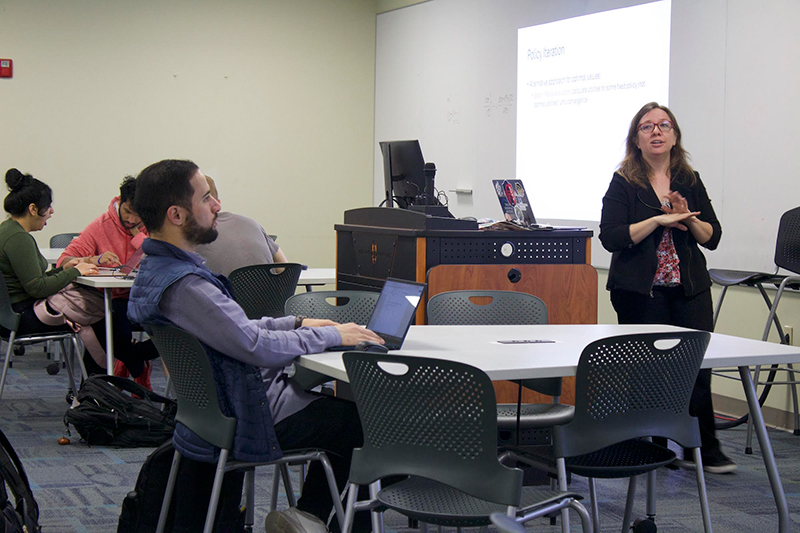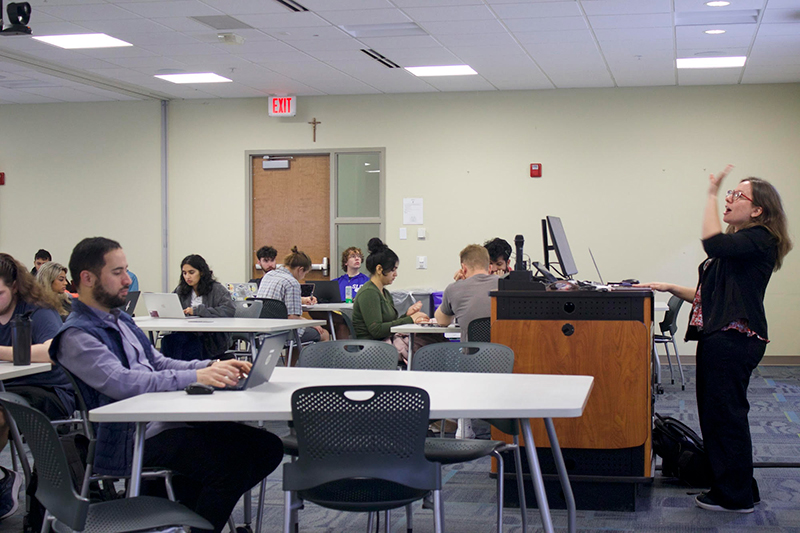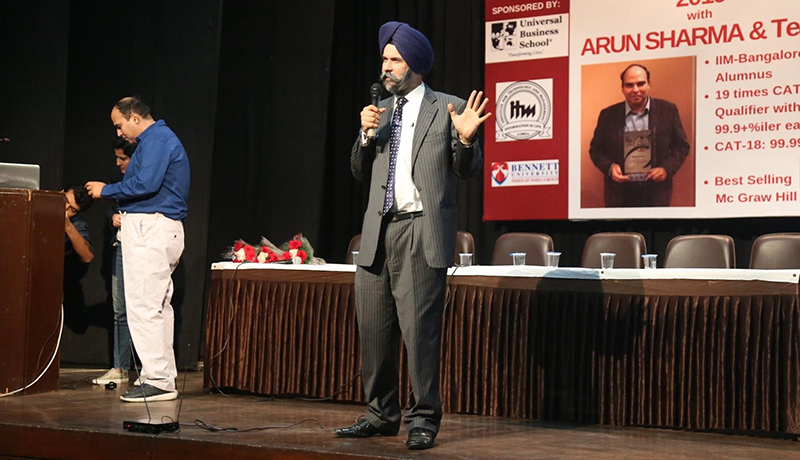 AI
AI
As AI transforms the world, more universities teach the technology
Saint Louis University student Jagruth Reddy Palle knew artificial intelligence was a leading-edge industry and a promising area of study when it kept coming up at every technology conference he attended. But what really attracted him to the field was how human AI seemed.
“It feels like you're learning about yourself, in a way,” Palle said.
The international student from India, who has a background in electronics, opted to pursue a master’s in AI and devote the rest of his educational career to the topic.
Currently, a record 2,400 students from India are studying at SLU at the same time that the Indian population in St. Louis has become the region’s fastest-growing group, according to SLU spokesperson Maggie Rotermund.
SLU’s master’s program is one of a small but growing number of university programs worldwide specializing in AI. In the U.S., the number of AI-related undergraduate and master’s degrees awarded has increased by about 120%, and doctorates have risen by a third since 2011, according to the Georgetown University Center for Security and Emerging Technology. In Reddy Palle’s native India, an entire school devoted to the field, Universal AI University, opened last year in Mumbai.
Meanwhile, universities are increasingly offering AI courses or coursework. MIT and the University of Michigan offer AI courses, the City Colleges of Chicago hold bimonthly classes taught by AI industry experts and the City University of London has an AI master’s program.
“We are heading to a time where no one can be oblivious to AI irrespective of what field you are working in,” said Tarun Anand, chancellor and founder of Universal AI University.
“Earlier, a law graduate could not care about technology, but now you should know how it will impact your work. This is the awareness that we are trying to give.”
AI is a rapidly growing sector. The global AI market is expected to exceed $305 billion in 2024 and grow by 16% a year until 2030, according to Statista.
Ironically, the money that can be made in the industry may be one reason specialized AI education programs are still relatively rare, said Abby Stylianou, an assistant professor teaching AI at SLU. She said well-paying AI professions outside of academia may lead some people within universities to shy away from offering specialized programs on the topic, in addition to the relative newness.
“The industry pays more, so how can we recruit and retain people, both faculty and students?” Stylianou said.
 Master students listening to a class lecture on Artificial Intelligence in Saint Louis. Photo by Zach Calder.
Master students listening to a class lecture on Artificial Intelligence in Saint Louis. Photo by Zach Calder.
With its master’s program, SLU hopes to change this reality by offering both academic credentials and knowledge crucial to the workplace. The program is consistently ranked among the top globally for international students seeking to study AI, according to the study abroad consultancy site Yocket. That’s largely because of its high graduate employability rate. And some students, like Reddy Palle, are drawn by curiosity as much as the prospect of a good job.
“What interested me in AI was the exploration,” said Reddy Palle, who plans to pursue a PhD. “The amount of stuff there is to explore in AI is massive, and it's all very interesting.”
AI education takes off in India
Like Reddy Palle, Kailash Nadh went abroad to study AI. Nadh first became interested in the topic during his undergrad years at Middlesex University in London, where he wrote a paper on AI and eventually earned a PhD in neurocomputation and computation linguistics.
But for peers who want to stay closer to home, there are now more opportunities to study AI in their native country. A national network of engineering and technology institutions called the Indian Institutes of Technology includes universities in Roorkee, Delhi and Madras, and all offer programs in AI.
“If you talk about IIT Madras, teaching of AI is actually happening in every department,” including those teaching about health and government, said Neelesh Upadhye, a professor in the math department there.
The university has also launched an online program for programming and data science teaching about AI tools — which caters to about 26,000 students, Upadhye said. It’s one of many programs the university developed for its Department of AI and Data Science to meet increased interest in the topics post-COVID, Upadhye said.
Universal AI University, meanwhile, is India’s first and only university focused strictly on AI. Formerly known as UBS Mumbai, it emphasizes hands-on instruction, which chancellor Tarun Anand feels is important because “AI is going to be the technology of the future.”
“Years ago we had just one IIT, (and) now we have 23 of them,” he said.
“Likewise, there will be universities that offer courses in AI in the future. … It means creating the technology professionals of the future, who will have a deep understanding of how data models work, how you create these predictive algorithms and how you get machine learning to take it one step further.”
 Tarun Anand, chancellor and founder of Universal AI University, India’s first AI focused university, says they are running out of capacity because of the demand.
Tarun Anand, chancellor and founder of Universal AI University, India’s first AI focused university, says they are running out of capacity because of the demand.
In addition to AI and Future Technologies schools, Universal AI University also houses other programs that integrate AI into the curriculum, such as psychology, music and sound engineering, fashion design and business.
The university doesn’t just attract students, Anand said, but also “corporate executives who don’t even know the basics of AI” who want to get training for their employees.
“Many companies are asking us to go and talk about AI as if it is a magic wand,” he said. “We are already underway with projects in our quantum computing lab (and) we are running out of capacity because of the demand.”
He lamented that his campus can’t handle this surge of interest by itself. “All of India will have to scale up to catch up,” he said.
Deep learning in Missouri
Nearly 9,000 miles away in St. Louis, students watched as Stylianou excitedly pointed from screen to screen, breezing through AI concepts. Although the material is complicated, she strives to make it less so. For instance, she likens training large language models like ChatGPT to training a puppy, since both rely on using rewards to teach functions.
She explained that students in the AI master’s program take subfield courses in AI, exploring related subjects like machine learning, deep learning, natural language processing and computer vision — AI that allows people to learn from inputs like photos or videos. In addition to their AI coursework, students are required to take core computer science classes and can choose between electives like bioinformatics and computer security.
“We have a reasonably large number of faculty who, at least in some way or another, are doing AI research and teach our AI courses,” Stylianou said. “We try to bring in real-world examples,” which can be challenging because academics don’t have some of the computational resources available in industry settings.
At Washington University in St. Louis, there’s no AI-specific program, but students pursuing undergraduate degrees in computer science can take a variety of AI and machine learning courses, said Nathan Jacobs, a computer science professor.
Like Stylianou, Jacobs emphasized the importance of faculty who understand and can teach the latest information in this ever-changing field.
“I think the big thing is having people that are experts in those fields so that you make sure that you're learning the modern techniques but also understanding enough of the fundamentals to be able to adapt to new, evolving methods," Jacobs said.
Meanwhile, even educators who don’t teach AI directly are increasingly encouraging its use in their classes.
“There's been an explosion in the last year of generative AI, so AI can actually create new things — new texts, new images, new video – and so we've been playing a lot with that during this past year,” said Scott Christianson, an associate teaching professor of business at the University of Missouri.
Christianson’s entrepreneurship class had the opportunity to train AI algorithms to identify different objects, such as water bottles or different types of beer.
“(AI) helps us stretch our creativity muscles and get better at thinking of creative ideas,” Christianson said. “Is it a viable business idea? Well, maybe not. But it's something that we probably wouldn't have thought of before.”
Promise and perils of the AI future
Professors said they expect interest in AI will only grow. A survey conducted by Salesforce showed that 73% of Indian respondents and 45% of U.S. respondents are already using generative AI. Upadhye expects AI literacy to skyrocket in the next decade.
The prospect of more AI raises concerns among some people that humans will lose control of the technology. But Anand doesn’t think that will happen. “At the end of the day, human beings are making the machines,” he said, adding that understanding the technology is a way to guard against being controlled by it.
Still, about half of Americans say they feel more concerned than excited about the increased use of AI, according to the Pew Research Center. And while Jacobs and Christianson value the presence of AI in their classrooms, both acknowledge the technology’s shortcomings.
Jacobs recalled using ChatGPT to generate an example of code in class, which he “naively copied and pasted” into his Powerpoint slides. Although the example “looked great,” he said, he realized as he presented the slideshow during a lecture that the example “didn’t actually work.”
Christianson referred to current AI technology as the “Wild West,” citing other ethical questions and pitfalls like creator biases and lack of privacy and regulation.
But Stylianou is hopeful that the technology will continue to improve, and students will continue to learn and grow alongside it.
“It's important for us to sort of keep up with the pace that things are changing, and that's hard,” Styllianou said. “It's going to be imperative for us as faculty to figure out how to incorporate (AI), but in a way that is beneficial for students and doesn't prevent them from learning … They're going to be using it in their careers.”
As for the oft-mentioned concern about AI replacing people in the workplace, instructors and students say they don’t see that happening on a large scale with most industries in the near future. Stylianou, specifically, believes there are a lot of jobs that will look “very different” in the next decade.
“If anyone tells you that they know where this field will be in five or 10 years, they're either lying or wrong,” Stylianou said. “I do think that AI will change the way that we do our jobs – it's changed how I do my job – but I don't think that it will eliminate jobs yet.”
That sentiment is echoed by Reddy Palle, who is getting ready to make his way into the work world.
“Jobs are not going anywhere,” he said, “they're just going to transform.”
(This is part of a project produced through a collaboration between University of Missouri business journalism students and young journalists from India. The project was overseen by Professor Randall Smith, the Donald W. Reynolds Endowed Chair in Business Journalism at MU, along with Laura Ungar, a reporter on the global health team at The Associated Press, and Sujoy Dhar, founder of the Indian news agency India Blooms News Service.)
Support Our Journalism
We cannot do without you.. your contribution supports unbiased journalism
IBNS is not driven by any ism- not wokeism, not racism, not skewed secularism, not hyper right-wing or left liberal ideals, nor by any hardline religious beliefs or hyper nationalism. We want to serve you good old objective news, as they are. We do not judge or preach. We let people decide for themselves. We only try to present factual and well-sourced news.







